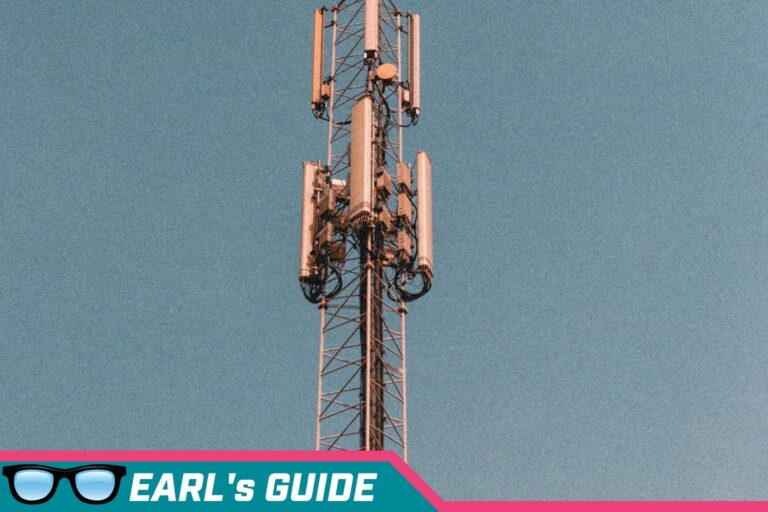In the digital age, where connectivity is no longer a luxury but a necessity, having access to reliable internet is crucial. This is true even when on the road or camping in an RV park. Whether it’s for navigating your next destination, streaming entertainment, or staying in touch with loved ones, good Wi-Fi has become an essential part of the RV lifestyle.
Unfortunately, many RVers often find themselves frustrated with poor Wi-Fi connectivity in various RV parks. This article explores the common reasons for weak Wi-Fi signals in RV parks and provides actionable solutions for both park owners and RVers.
Why your Campground Wi-Fi Sucks
Part I: Understanding the Problem
1.1 Inadequate Infrastructure
- Outdated Equipment: Many RV parks still rely on old and outdated routers and access points, resulting in slow and unreliable connections.
- Limited Bandwidth: RV parks may have a limited internet plan, which can easily be overwhelmed if multiple guests are using the network simultaneously.
- Poor Network Design: Improper placement of routers and access points can result in dead zones or weak signals throughout the park.
1.2 Environmental Challenges
- Physical Barriers: Trees, buildings, and other RVs can block or degrade Wi-Fi signals.
- Distance from Access Points: The farther you are from the router, the weaker the signal will be.
1.3 High Demand
- Multiple Devices: With each guest using multiple devices, the demand on the Wi-Fi network increases, leading to slower speeds.
- Streaming and Downloading: Activities like video streaming can consume large amounts of bandwidth, impacting the performance for others.
Part II: Solutions for RV Park Owners
2.1 Upgrade the Equipment
- Invest in Modern Routers: Utilizing the latest routers and access points can drastically increase speed and reliability.
- Implement a Mesh Network: A mesh network allows seamless connectivity across the park, reducing dead zones.
2.2 Optimize Network Design
- Strategically Place Access Points: Proper placement can help ensure coverage throughout the park.
- Monitor and Manage Bandwidth: Implementing bandwidth management tools can allocate resources effectively among guests.
2.3 Offer Different Tiers of Service
- Free Basic Service: Provide free access for basic browsing, and offer premium packages for those who need higher speeds.
- Dedicated Connections for Long-Term Guests: Offer hardwired connections or dedicated Wi-Fi for guests staying for extended periods.
Part III: Solutions for RVers
3.1 Invest in a Wi-Fi Extender
- Boost Your Signal: Wi-Fi extenders can help you pick up the RV park’s Wi-Fi signal even if your site is far from an access point.
3.2 Use a Mobile Hotspot
- Personal Connectivity: If the RV park’s Wi-Fi is unreliable, consider using a mobile hotspot with your cellular plan.
3.3 Be Considerate of Others
- Avoid Bandwidth-Hogging Activities: Be mindful of activities that may impact others, like streaming HD videos during peak times.
Wi-Fi connectivity is vital for modern RVers, and RV park owners should recognize its importance in providing a positive guest experience. Through upgrading infrastructure, optimizing network design, and offering various connection options, park owners can greatly enhance their Wi-Fi services.
RVers, too, have a role in ensuring a satisfactory online experience, by using technology like Wi-Fi extenders, mobile hotspots, and being mindful of their internet usage.
In the end, addressing the Wi-Fi problem is a win-win situation, fostering better relationships between RV parks and their guests, and paving the way for a more connected and enjoyable
The Negative Impact of Poor Wi-Fi on RV Park Guests
Wi-Fi has become a staple of everyday life for most people, and that includes those who are traveling or living in RVs. When guests come to an RV park, they often expect seamless internet connectivity to cater to various needs such as entertainment, work, or staying connected with family and friends. Poor Wi-Fi in an RV park can significantly affect the guest experience in several ways.
1. Frustration and Inconvenience
A weak or unstable Wi-Fi connection can lead to a frustrating experience for guests. Whether it’s trying to send an email, navigate a map, or simply browse the internet, a slow connection adds unnecessary stress and inconvenience.
- Loss of Productivity: For those who rely on the internet for remote work, poor Wi-Fi can result in loss of productivity, missed deadlines, and potential income loss.
- Difficulty in Planning Activities: Many travelers rely on the internet to plan their day-to-day activities, book tickets, or check weather forecasts. Poor connectivity can make these tasks cumbersome and time-consuming.
2. Impact on Entertainment
- Limited Streaming Capabilities: In the evenings, many RVers enjoy streaming movies or shows. A bad Wi-Fi connection can hinder this, leading to buffering or low-quality streams.
- Challenges in Social Networking: Staying connected with friends and family via social media is a popular way to share experiences. Slow internet might make uploading photos or videos an exasperating experience.
3. Negative Effects on Long-Term Guests
RV parks often attract long-term guests who stay for weeks or months. These guests usually have more substantial connectivity needs.
- Isolation from Social and Professional Circles: A lack of reliable internet might create feelings of isolation, as guests may struggle to maintain social or professional connections.
- Difficulty in Accessing Essential Services: From online banking to telemedicine, many essential services require a steady internet connection. A lack of these can lead to serious inconveniences.
4. Reputation Damage
- Poor Reviews and Feedback: Modern travelers often check reviews before booking. Negative feedback regarding Wi-Fi can deter potential guests, harming the RV park’s reputation.
- Loss of Repeat Business: A guest who has a bad experience with Wi-Fi is less likely to return, leading to loss of repeat business.
5. Affects Modern Lifestyle Needs
- Impact on Education: Families with children may need the internet for online learning. A poor connection can disrupt their education.
- Challenges in Remote Work: As remote work becomes more common, travelers might choose destinations based on their ability to work from there. Inadequate Wi-Fi will make an RV park less appealing to digital nomads.
Wi-Fi is not just a convenience; it’s a necessity that deeply influences the guest experience at an RV park. Poor Wi-Fi can lead to frustration, loss of productivity, entertainment challenges, and potential isolation, especially for long-term guests. It also harms the reputation of the park, leading to negative reviews and loss of repeat customers.
For RV park owners, recognizing and addressing these concerns is not just about offering an amenity; it’s about understanding and meeting a fundamental need of modern life. Investing in reliable and robust Wi-Fi isn’t merely a business decision; it’s a commitment to ensuring that guests can seamlessly integrate their technology-dependent lifestyles into the adventurous and freeing world of RV travel. By doing so, RV park owners can enhance satisfaction, loyalty, and overall guest experience.
The Negative Impact of Poor Wi-Fi on RV Park Reviews
In the world of travel and hospitality, online reviews have become incredibly influential in shaping the reputation and success of a destination. For RV parks, where amenities like Wi-Fi are often considered essential, a poor internet connection can have serious repercussions on online reviews. Below is a detailed exploration of how bad Wi-Fi can negatively impact reviews of an RV park.
1. Frustration Leading to Negative Reviews
- Immediate Impact on Satisfaction: When guests encounter slow or unstable Wi-Fi, their immediate satisfaction is affected. This frustration can lead them to vent their feelings in online reviews, focusing on the negative aspects of their stay.
- Highlighting Unmet Expectations: Today’s RVers often expect a certain standard of connectivity. When these expectations are not met, the resulting disappointment can lead to scathing reviews.
2. Connection Between Wi-Fi and Overall Experience
- Perceived Value: A guest’s perception of value includes not only the cost of staying at the RV park but also the quality and availability of amenities. Poor Wi-Fi can lead to a perception of low value for money, a sentiment that may be echoed in reviews.
- Impact on Other Amenities: Even if other amenities are satisfactory, a bad Wi-Fi experience can overshadow these positive aspects, leading to a negative overall impression that will be reflected in reviews.
3. Influence on Potential Guests
- Loss of Trust: When potential guests read negative reviews highlighting poor Wi-Fi, it erodes their trust in the RV park. The fear of experiencing the same issues may deter them from booking.
- Difficulty in Damage Control: Responding to negative reviews and reassuring potential guests can be challenging. Once the reputation of having poor Wi-Fi is established, it may require significant effort and investment to change that perception.
4. Impact on Specific Target Groups
- Digital Nomads and Remote Workers: These groups may prioritize Wi-Fi when choosing an RV park. Negative reviews concerning Wi-Fi can severely impact the park’s appeal to these growing segments.
- Families and Young Travelers: For families with children or younger travelers who may rely heavily on internet access for entertainment and education, reviews mentioning bad Wi-Fi might be a deciding factor against choosing the park.
5. Long-Term Impact on Reputation
- Challenges in Building Loyalty: Repeat business often relies on a consistently good experience. Negative reviews about Wi-Fi might not only deter new customers but also prevent previous guests from returning.
- Competitive Disadvantage: In a competitive market, negative reviews related to something as fundamental as Wi-Fi can place an RV park at a disadvantage compared to competitors who may be praised for their internet connectivity.
6. Impact on Rankings and Recommendations
- Lower Ratings on Review Sites: Poor ratings directly related to Wi-Fi can lower the overall score on review platforms, affecting the park’s visibility and attractiveness to potential guests.
- Exclusion from “Best Of” Lists: Travel bloggers and influencers often compile lists of the best RV parks. Negative reviews regarding Wi-Fi could lead to exclusion from these lists, reducing exposure and attractiveness.
Wi-Fi, often perceived as a basic amenity, can profoundly influence an RV park’s online reputation. Negative experiences translate into negative reviews, which in turn affect the perception, trust, and attractiveness of the park to potential guests.
Understanding the importance of reliable Wi-Fi, taking steps to ensure quality service, and actively engaging with guests who have had less-than-ideal experiences can help mitigate the negative impact on reviews.
RV park owners must recognize that in the interconnected digital age, Wi-Fi is not just an amenity but a reflection of the park’s commitment to meeting the needs and expectations of the modern traveler. Addressing this crucial aspect can lead to a more positive online reputation, greater guest satisfaction, and ultimately, a more successful and thriving business.
Wi-Fi as a Necessity: A Comparative Look at Airlines, Hotels, and Campgrounds
The provision of Wi-Fi has become a standard practice in various sectors of the hospitality and travel industry. From airlines to hotels, internet connectivity is no longer viewed as a luxury but a fundamental service. Campgrounds, too, must recognize this shift and embrace Wi-Fi as a necessity rather than an optional amenity. This article examines the importance of Wi-Fi across different sectors and how campgrounds can learn from these models.
1. Airlines: In-Flight Connectivity
- Standard Service: Many airlines offer in-flight Wi-Fi as part of the onboard experience. It allows passengers to stay connected, work, or be entertained during their flight.
- Tiered Options: Some airlines offer basic connectivity for free, with options to purchase enhanced services for a more robust connection or streaming capabilities.
Lesson for Campgrounds: Providing basic Wi-Fi as a standard service acknowledges the modern need for connectivity, even in transient spaces. Offering upgraded options can cater to those with higher demands, adding a revenue stream.
2. Hotels: Essential for Guest Experience
- Part of the Package: Wi-Fi is often included in the room rate in hotels, reflecting the understanding that internet access is as fundamental as any other room amenity.
- Loyalty Programs: Many hotel chains offer enhanced Wi-Fi to members of their loyalty or frequent stay programs. It’s seen as a value-add that encourages repeat business and brand loyalty.
Lesson for Campgrounds: By offering basic Wi-Fi to all guests and enhanced services to loyalty members, campgrounds can both meet the expectations of the modern traveler and incentivize repeat visits.
3. Campgrounds: A Must-Have Amenity
- Meeting Guest Expectations: Similar to airlines and hotels, campgrounds must recognize that guests expect Wi-Fi. It’s a connection to the world, whether for practical purposes like navigation or leisure activities like streaming.
- Adopting the Hotel Model: Campgrounds can look to the hotel industry for a model of how to implement Wi-Fi. Offering a base level for all guests and enhanced options for frequent stay or loyalty program members can satisfy various needs.
- Importance for Various Campers: From families who may need connectivity for children’s entertainment to remote workers who require robust internet for their jobs, Wi-Fi is an essential service for a wide range of campers.
The provision of Wi-Fi is no longer a question of “if” but “how.” Airlines and hotels have recognized this and made Wi-Fi a standard part of the customer experience. Campgrounds must follow suit, understanding that connectivity is a fundamental expectation of modern travelers.
By adopting a model similar to that used by hotels, campgrounds can offer a tiered Wi-Fi service that meets the needs of all guests while providing opportunities for upselling and loyalty building. Such a strategy recognizes the diverse needs of campers and positions the campground as a modern, customer-focused destination.
In the ever-connected world, Wi-Fi is more than just an amenity; it’s a necessity that transcends location and environment. Campgrounds that recognize and adapt to this reality will be better positioned to attract, satisfy, and retain the modern camper. Whether in the air, in a hotel, or in the heart of nature, connectivity is a constant, and those who provide it are meeting the needs of today’s traveler.

Robert Earl
Robert EarlRobert has 20+ years of experience as a Real Estate Agent, Coach, Digital Marketer & Author, coupled with a unique expertise in professional RV Park Management. His time as an RV Park Manager has been marked by a strong ability to increase campground occupancy and revenue through strategic management and targeted marketing efforts. His dual career in online marketing and RV Park Management provides a rich perspective on success in diverse fields. Robert Earl is passionate about teaching and empowering others to pursue their dreams and create sustainable income. Whether through a career in real estate, affiliate marketing, niche blogging, or transforming campgrounds into thriving communities, his proven strategies and techniques have helped numerous individuals and businesses succeed. Based on his years of experience and knowledge in the online marketing industry, along with his hands-on management in the RV Park sector, he has crafted a unique and effective approach to personal and professional growth. In addition to his business pursuits, Robert is also a CrossFit Online Level 1 Trainer (CF-OL1) and enjoys fitness activities, including Rucking workouts while traveling the country. His multifaceted career showcases his dedication to growth, innovation, and the pursuit of excellence in various domains.






